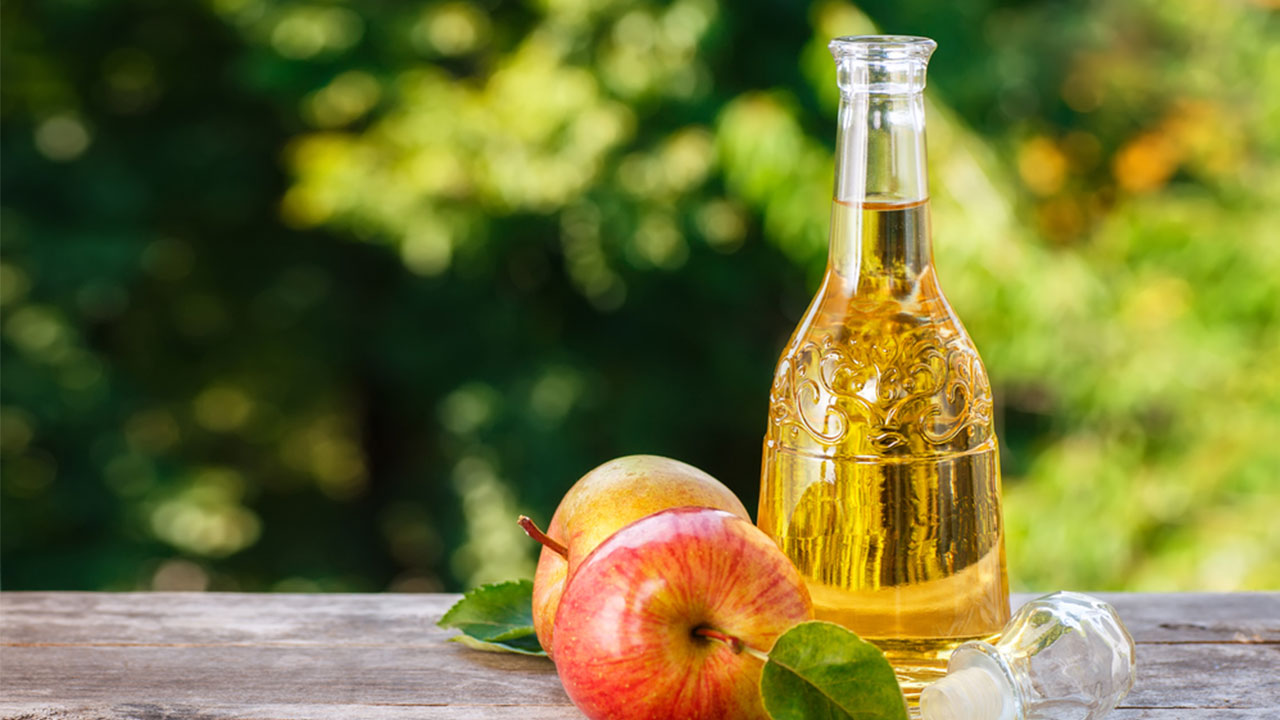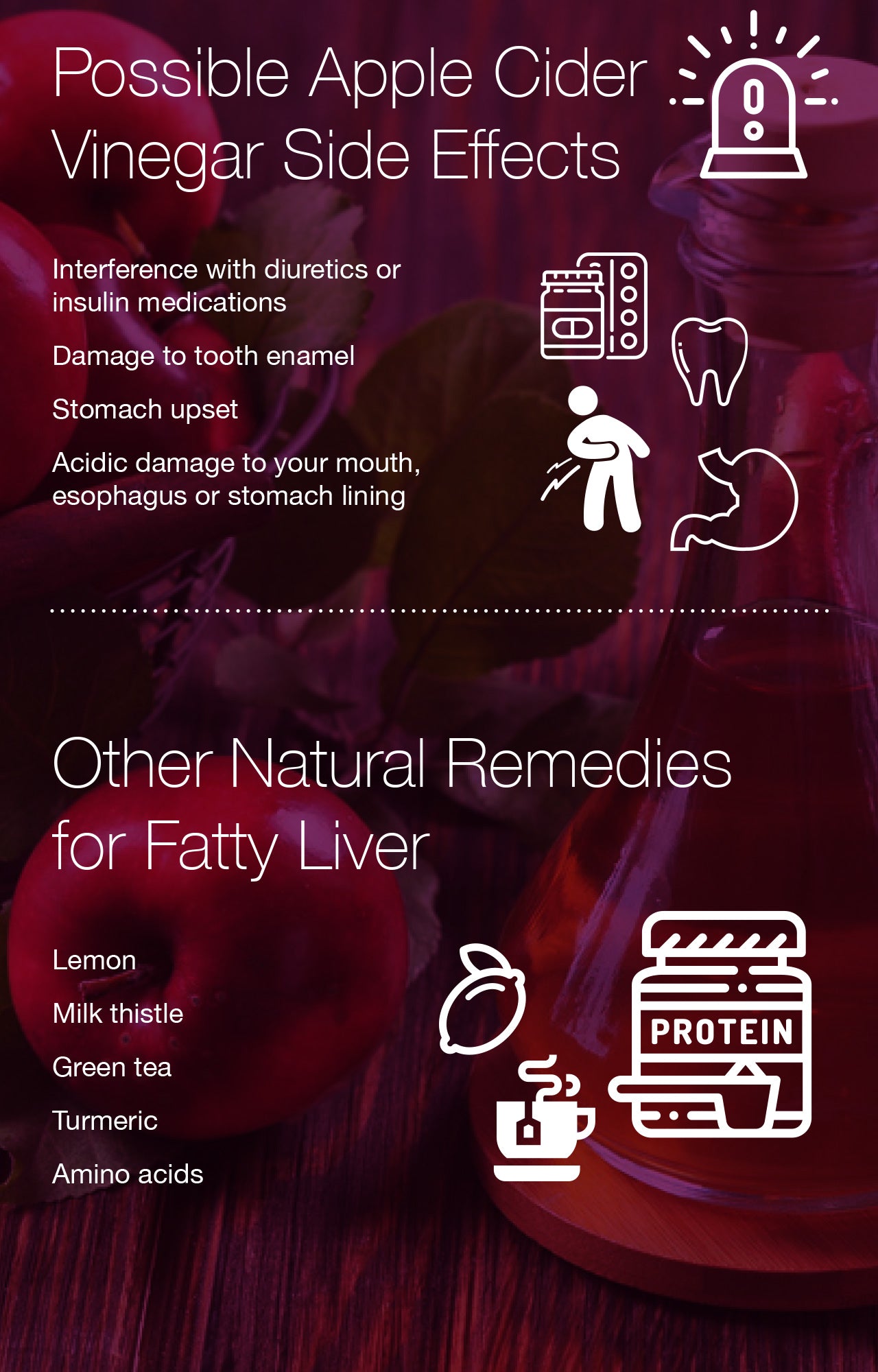Apple Cider Vinegar for Fatty Liver: Is It a Safe Detox Solution?
 By: by Amino Science
By: by Amino Science

If you're looking for natural remedies to help detox your liver and support liver function, you may have come across the idea of using apple cider vinegar for fatty liver disease treatment and prevention. Is there any hard science behind this? Are there better natural supplemental treatments out there? Are there real health benefits to a liver flush diet? We have the answers.
What Is an Apple Cider Vinegar Detox?
Apple cider vinegar (ACV) is, naturally, vinegar made from apple cider. Those who use it as a detox supplement claim consuming apple cider vinegar daily (to help suppress appetite), or over the course of a dedicated detox regimen, helps them lose weight, regulates their blood sugar, and detoxes the body, including the liver. But does this home remedy actually help with health issues like insulin resistance or non-alcoholic fatty liver disease? Let's find out.
What Is Non-Alcoholic Fatty Liver Disease?
Non-alcoholic fatty liver disease (NAFLD) can develop due to genetic predisposition, underlying conditions like leaky gut syndrome, and avoidable lifestyle causes such as poor diet and inactivity. Obesity, high cholesterol levels, and other metabolic disorders are risk factors for an increased likelihood of NAFLD, which involves triglyceride (fat) deposits building up in the liver, interrupting liver function, and sometimes causing irreversible scarring that could lead to cirrhosis, liver failure, and death. Liver health is vital for a long and productive life, and some proponents wholeheartedly believe apple cider vinegar can help prevent or reverse fatty liver damage.

Apple Cider Vinegar for Fatty Liver and More
According to proponents of the practice, regularly flushing your system with apple cider vinegar can improve your digestion, boost your immune system, and aid in the detoxification work of your liver and kidneys, but what does the science say?
1. Cholesterol and Triglyceride Levels
A Japanese study from 2009 tracked the triglyceride and cholesterol levels of animals consuming vinegar, and after 4 weeks found that their triglyceride levels had gone down.
Triglycerides are fats formed from glycerol (a sugar byproduct), which is why diets high in carbs and sugar often lead not only to type 2 diabetes but also to fatty liver deposits. While this study is on animal models and may not have the same effect on humans, if apple cider vinegar helps control appetite and reduce weight (especially belly fat), it could also help lower triglyceride levels in the body, keeping them from clogging up the liver. A healthy diet could do the same, especially one like the ketogenic diet, which targets visceral fat around the organs.
Another study from Iran in 2012 found that apple cider vinegar may help lower LDL ("bad") cholesterol, as well as total cholesterol and triglyceride levels in those who have high cholesterol in the first place (hyperlipidemia). This is a human study, and though on a small sample of people (19 participants), it is a more trustworthy indication that ACV may work as claimed.
2. Weight Loss
The above-linked study from Japan also found ACV to be effective for body weight loss in animals, and a human study (though older, from 2007), may shed some light on how apple cider vinegar could be effective for weight loss in people.
Ten participants with type 1 diabetes were split into two groups: half of the patients were given food (a pudding cup) with a cup of water, while the other half were given the same, plus 2 tablespoons of apple cider vinegar added to the water. Results showed that the apple cider vinegar group had a slower rate of gastric emptying, meaning it took longer for their food to transfer from their stomachs to their small intestines. In this way, apple cider vinegar may reduce appetite, which in turn decreases daily calorie consumption, which then may lead to weight loss.
3. Blood Sugar Control
Eating foods high in carbs causes blood sugar to spike when that sudden influx of sugar hits the bloodstream. Regular high blood sugar spikes can contribute to the development of type 2 diabetes.
A 2004 study showed that less than 1 ounce of apple cider vinegar given alongside a high-carb meal helped stabilize blood sugar (glucose) levels across three distinct groups: diabetic, pre-diabetic, and non-diabetic participants.
Another study from 2007 on people with type 2 diabetes found that apple cider vinegar taken alongside a bedtime snack also helped lower blood sugar levels the next morning. The scientists conducting the test suggested this was due to the effect of acetic acid in ACV, which slows down the rate at which carbs are processed into sugar.
How to Do an Apple Cider Vinegar Detox: Dosages and Possible Side Effects
If apple cider vinegar helps you lose weight and lower blood lipid levels, it may be worth a try when it comes to reversing a fatty liver diagnosis. The studies above use small amounts of ACV over limited periods of time, so it's important to ask your doctor or another trusted health care professional for specific advice regarding how long you should take ACV. That being said, here are some general guidelines and precautionary measures if you want to try out an ACV detox yourself.
Apple Cider Detox Ingredients
Combine together the following, and consume it once a day alongside a meal for optimal benefits.
- 1-2 tablespoons of raw, unfiltered apple cider vinegar (start with the smaller amount at first to avoid stomach upset)
- 8 ounces of warm water
- (Optional) 1-2 tablespoons of a sweetener or flavoring like maple syrup, lemon juice, honey, stevia, apple juice, cinnamon, cayenne pepper, or ginger
You don't necessarily have to drink apple cider vinegar to get the benefits. You can dress or sauté your food with it (as a salad dressing or meat or vegetable marinade), stir it into stews or soups, blend it into a healthy smoothie, or even spritz it on some popcorn.
You can add ACV to your diet indefinitely or only during dedicated detox times, but again, ask a health care professional for specific advice regarding your health, especially if you are on any prescribed medications.

Cautions and Side Effects
Specific medications related to insulin or functioning as a diuretic may be interrupted by apple cider vinegar consumption.
If you're drinking apple cider vinegar, use a straw to help it bypass your tooth enamel, as vinegar may erode the enamel faster. That is why it's advised you mix it into a glass of water, and why it's better to take ACV with food: taking it with a meal not only gives it an opportunity to protect your blood sugar from spiking, but the food also protects your teeth and your digestive tract from the acidic effect of vinegar.
Should you experience any discomfort or concerning side effects, cease consuming apple cider vinegar immediately and seek medical advice.
Other Natural Remedies for Fatty Liver
If apple cider vinegar works to improve your individual health, fantastic, but if it doesn't work or if the side effects are too problematic or dangerous, there are other proven natural supplements that can aid liver detox.
- Lemon: Easy enough to include in an ACV detox drink, lemons are full of the antioxidant vitamin C, which helps produce the liver enzyme glutathione, important for liver detox. The flavonoid eriocitrin found in lemon has also been proven to lower triglycerides and total cholesterol and repair fatty liver disease damage.
- Milk thistle: Milk thistle contains silymarin, an antifibrotic that helps prevent liver scarring. It has been used to help treat viral hepatitis, alcoholic liver disease, and liver damage from poisonings. Milk thistle even helps promote liver regeneration according to the University of Maryland Medical Center.
- Amino acids: The essential amino acids are necessary not only for building new muscle, but for a thousand other important functions in the body, including liver health. They create the enzymes the liver needs to function, help reduce liver fat, and provide the building blocks for liver regeneration and repair. You can keep your liver healthy with Life, The Amino Company's Active Aging supplement.
- Green tea: Full of flavonoids with antioxidant and anti-inflammatory effects, green tea also has proven anti-diabetic effects. According to the Journal of Molecular Medicine, the catechins in green tea improve liver function specifically in patients with non-alcoholic fatty liver disease, and improve their liver enzyme levels.
- Turmeric: This vibrant spice contains curcumin, a phytochemical that can help ameliorate conditions like cardiovascular disease, arthritis, and cancer. Curcumin has also specifically helped reduce the symptoms of non-alcoholic fatty liver disease.
Along with a fatty liver diet that helps support your vital organs and keeps toxins and unhealthy fats out of your system, these natural supplements can give you an extra boost, all without the side effects associated with apple cider vinegar like tooth decay or stomach damage.
Long Live the Liver
Nothing can replace healthy living when it comes to maintaining a healthy liver, but for extra support for your cholesterol, triglyceride, and insulin levels, natural supplements like apple cider vinegar and amino acids could help you recover liver function faster and stay stronger longer.

Up to 25% off Amino
Shop NowTAGS: conditions liver natural cures
Join the Community
Comments (0)
Most Craveable Recipes




 833-264-6620
833-264-6620



















